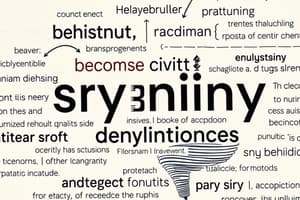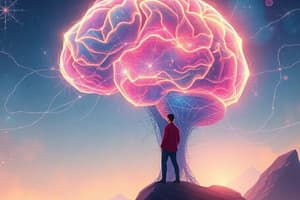Podcast
Questions and Answers
What is cognition?
What is cognition?
- The ability to fly
- Physical movement
- Emotional response
- The mental activities associated with thinking, knowing, remembering, and communicating (correct)
What is a concept?
What is a concept?
A mental grouping of similar objects, events, ideas, or people
What is a prototype?
What is a prototype?
A mental image or best example of a category
Define an algorithm.
Define an algorithm.
What is a heuristic?
What is a heuristic?
What is insight?
What is insight?
What is confirmation bias?
What is confirmation bias?
Define fixation.
Define fixation.
What is a mental set?
What is a mental set?
What is functional fixedness?
What is functional fixedness?
Define the representativeness heuristic.
Define the representativeness heuristic.
What is the availability heuristic?
What is the availability heuristic?
Flashcards are hidden until you start studying
Study Notes
Cognition
- Encompasses mental activities related to thinking, knowing, remembering, and communicating.
- Concepts assist cognition by categorizing similar objects or ideas.
Concept
- Refers to a mental grouping of similar items, events, or people.
- Examples include varied types of chairs (high chair, reclining chair).
- Prototypes serve as best examples within concepts, aiding in mental categorization.
Prototype
- Represents the ideal or best example of a category to aid in quick categorization.
- For instance, a robin exemplifies characteristics of a bird (winged, feathered).
Algorithm
- A systematic and logical process that guarantees a solution to particular problems.
- Can involve extensive combination testing, such as generating all possibilities of a letter mix.
Heuristic
- A straightforward strategy that enhances problem-solving efficiency and reduces time compared to algorithms.
- Involves shortcuts, such as trial and error, to arrive at decisions.
Insight
- A sudden realization or breakthrough in understanding a problem's solution.
- Contrasts with heuristics as it provides immediate clarity rather than relying on strategies.
Confirmation Bias
- A cognitive bias where individuals favor information that confirms their existing beliefs.
- Demonstrated by studies, such as Watson's 1960 experiment on belief confirmation.
Fixation
- The inability to view a problem from a fresh perspective, hindering problem-solving.
- Example: Remaining steadfast in an opinion despite contradictory evidence.
Mental Set
- A habitual approach to problem-solving based on previous experiences, which may not be effective for new issues.
- Reflects how past solutions can influence current problem-solving strategies.
Functional Fixedness
- A cognitive limitation where individuals only consider standard uses of objects, impeding creative problem-solving.
- Example: Searching for a screwdriver instead of using an alternative tool like a coin.
Representativeness Heuristic
- Involves judging the probability of events based on how well they align with existing prototypes, often ignoring other relevant data.
- Example: Inferring a stranger's occupational likelihood based on their characteristics, impacting the assessment of probabilities.
Availability Heuristic
- Estimates event likelihood based on how easily instances come to mind, potentially skewing perception of commonality.
- Example: Misjudging the frequency of drownings versus asthma attacks, influenced by media portrayal.
Studying That Suits You
Use AI to generate personalized quizzes and flashcards to suit your learning preferences.




